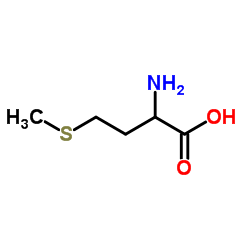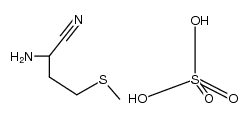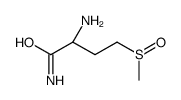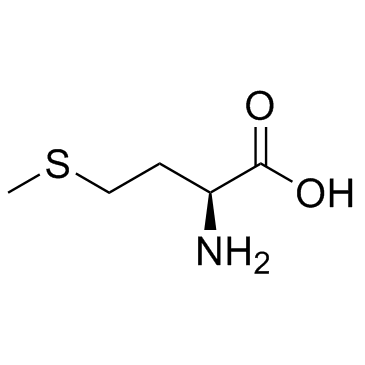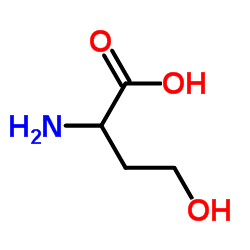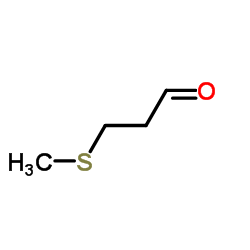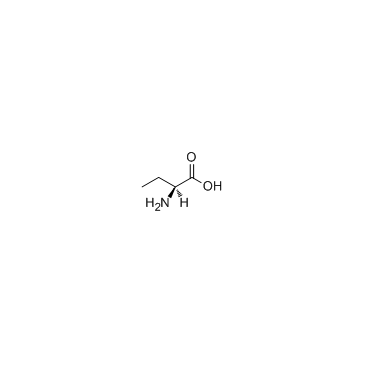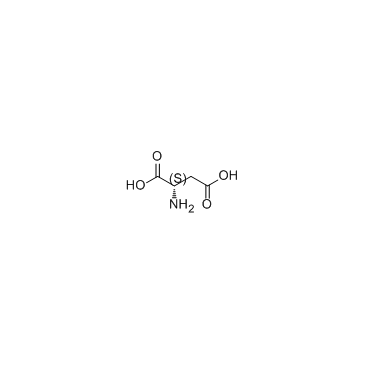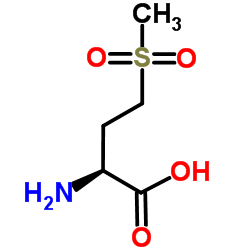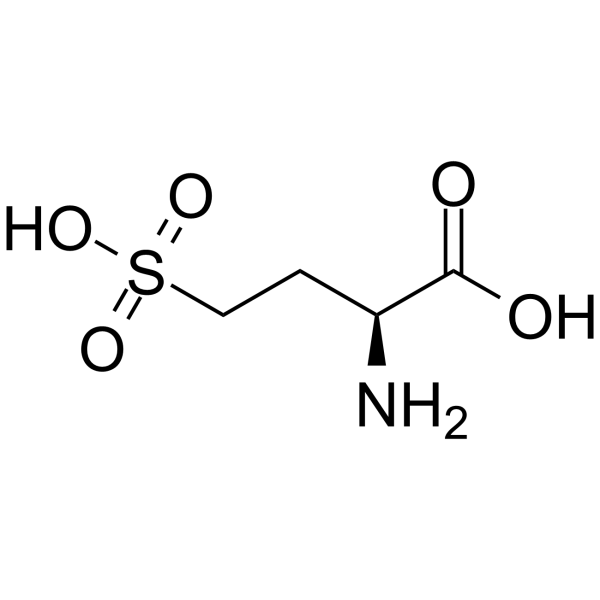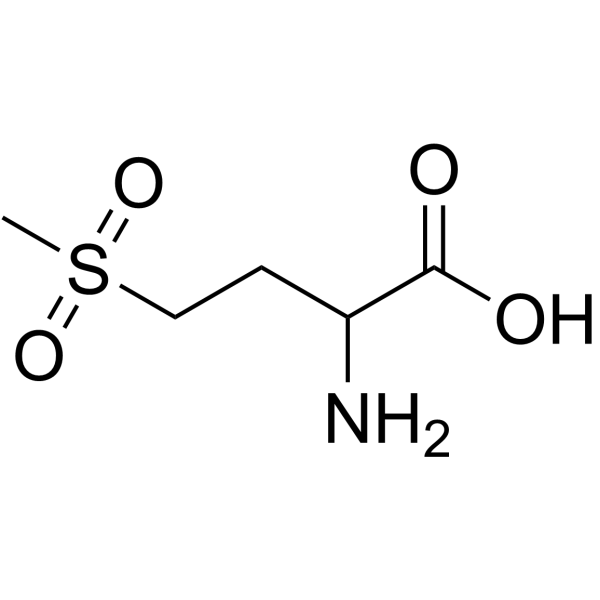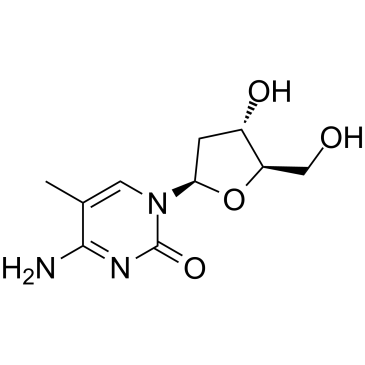3226-65-1
| Name | L-methionine S-oxide |
|---|---|
| Synonyms |
Butanoic acid, 2-amino-4-(methylsulfinyl)-, (2S)-
EINECS 221-758-0 (2S)-2-Amino-4-(methylsulfinyl)butanoic acid (3-Amino-3-carboxypropyl)(methyl)sulfoniumolate 2-Amino-4-(methylsulfinyl)butanoic acid UNII:XN1XVI4B2C MFCD00063093 L-methionine S-oxide L-2-Amino-4-(methylsulfinyl)butanoic acid Butanoic acid, 2-amino-4-(methylsulfinyl)- sulfonium, (3-amino-3-carboxypropyl)hydroxymethyl-, inner salt UNII:O74B4F6OYL L-Methionine Sulfoxide H-Met(O)-OH |
| Description | L-Methionine sulfoxide (H-Met(O)-OH), a metabolite of Methionine, induces M1/classical macrophage polarization, and modulates oxidative stress and purinergic signaling parameters[1]. |
|---|---|
| Related Catalog | |
| References |
| Density | 1.4±0.1 g/cm3 |
|---|---|
| Boiling Point | 434.3±40.0 °C at 760 mmHg |
| Melting Point | 234-235ºC |
| Molecular Formula | C5H11NO3S |
| Molecular Weight | 165.211 |
| Flash Point | 216.4±27.3 °C |
| Exact Mass | 165.045959 |
| PSA | 99.60000 |
| LogP | -1.62 |
| Vapour Pressure | 0.0±2.2 mmHg at 25°C |
| Index of Refraction | 1.570 |
| Storage condition | 2-8°C |
| Stability | Temperature Sensitive, Hygroscopic |
|
Section 1. Chemical Product and Company Identification L-Methionine Sulfoxide Common Name/ Trade Name Manufacturer Commercial Name(s) Synonym
Chemical Name Chemical Family L-Methionine Sulfoxide Section 4. First Aid Measures Eye ContactCheck for and remove any contact lenses. In case of contact, immediately flush eyes with plenty of water for at least 15 minutes. Cold water may be used. Get medical attention if irritation occurs. Skin ContactWash with soap and water. Cover the irritated skin with an emollient. Get medical attention if irritation develops. Cold water may be used. Serious Skin ContactNot available. InhalationIf inhaled, remove to fresh air. If not breathing, give artificial respiration. If breathing is difficult, give oxygen. Get medical attention. Serious InhalationNot available. IngestionDo NOT induce vomiting unless directed to do so by medical personnel. Never give anything by mouth to an unconscious person. If large quantities of this material are swallowed, call a physician immediately. Loosen tight clothing such as a collar, tie, belt or waistband. Serious IngestionNot available. Section 5. Fire and Explosion Data Flammability of the Product May be combustible at high temperature. Auto-Ignition Temperature Not available. Flash PointsNot available. Flammable LimitsNot available. These products are carbon oxides (CO, CO2), nitrogen oxides (NO, NO2...). Products of Combustion Fire Hazards in Presence of Slightly flammable to flammable in presence of heat. Various SubstancesNon-flammable in presence of shocks. Explosion Hazards in Presence Slightly explosive in presence of open flames and sparks. of Various SubstancesNon-explosive in presence of shocks. Fire Fighting MediaSMALL FIRE: Use DRY chemical powder. and InstructionsLARGE FIRE: Use water spray, fog or foam. Do not use water jet. Special Remarks onAs with most organic solids, fire is possible at elevated temperatures Fire Hazards Special Remarks on Explosion Fine dust dispersed in air in sufficient concentrations, and in the presences of an ignition source is a potential dust Hazardsexplosion hazard. Section 6. Accidental Release Measures Small SpillUse appropriate tools to put the spilled solid in a convenient waste disposal container. Finish cleaning by spreading water on the contaminated surface and dispose of according to local and regional authority requirements. Large Spill Use a shovel to put the material into a convenient waste disposal container. Finish cleaning by spreading water on the contaminated surface and allow to evacuate through the sanitary system. L-Methionine Sulfoxide Section 7. Handling and Storage PrecautionsKeep away from heat. Keep away from sources of ignition. Do not breathe dust. Keep away from incompatibles such as oxidizing agents, acids, alkalis. StorageKeep container tightly closed. Keep container in a cool, well-ventilated area. Section 8. Exposure Controls/Personal Protection Engineering ControlsUse process enclosures, local exhaust ventilation, or other engineering controls to keep airborne levels below recommended exposure limits. If user operations generate dust, fume or mist, use ventilation to keep exposure to airborne contaminants below the exposure limit. Personal Protection Safety glasses. Lab coat. Dust respirator. Be sure to use an approved/certified respirator or equivalent. Gloves. Personal Protection in Case of Splash goggles. Full suit. Dust respirator. Boots. Gloves. A self contained breathing apparatus should be used a Large Spillto avoid inhalation of the product. Suggested protective clothing might not be sufficient; consult a specialist BEFORE handling this product. Exposure LimitsNot available. Section 9. Physical and Chemical Properties Physical state and appearance Solid. (Powdered solid.)OdorCharacteristic. TasteNot available. Molecular Weight165.21 g/mole ColorWhite. Off-white. pH (1% soln/water)Not available. Boiling PointNot available. Melting PointNot available. Critical TemperatureNot available. Not available. Specific Gravity Vapor PressureNot applicable. Vapor DensityNot available. VolatilityNot available. Odor ThresholdNot available. Not available. Water/Oil Dist. Coeff. Ionicity (in Water)Not available. See solubility in water. Dispersion Properties SolubilitySoluble in cold water. Section 10. Stability and Reactivity Data StabilityThe product is stable. Not available. Instability Temperature Conditions of InstabilityExcess heat, incompatible materials, dust generation Incompatibility with variousReactive with oxidizing agents, acids, alkalis. substances CorrosivityNot available. L-Methionine Sulfoxide Special Remarks onNot available. Reactivity Special Remarks onNot available. Corrosivity PolymerizationWill not occur. Section 11. Toxicological Information Routes of EntryInhalation. Ingestion. Toxicity to AnimalsLD50: Not available. LC50: Not available. Chronic Effects on Humans Not available. Other Toxic Effects onSlightly hazardous in case of skin contact (irritant), of ingestion, of inhalation. Humans Special Remarks onNot available. Toxicity to Animals Special Remarks on Not available. Chronic Effects on Humans Special Remarks on otherAcute Potential Health Effects: Toxic Effects on HumansSkin: May cause skin irritation. Eyes: May cause eye irritation. Inhalation: May cause respiratory tract irritation. Ingestion: May cause gastrointestinal tract irritation. The toxicological properties of this substance have not been fully investigated. Section 12. Ecological Information EcotoxicityNot available. BOD5 and CODNot available. Products of BiodegradationPossibly hazardous short term degradation products are not likely. However, long term degradation products may arise. Toxicity of the ProductsThe product itself and its products of degradation are not toxic. of Biodegradation Special Remarks on theNot available. Products of Biodegradation Section 13. Disposal Considerations Waste DisposalWaste must be disposed of in accordance with federal, state and local environmental control regulations. Section 14. Transport Information DOT ClassificationNot a DOT controlled material (United States). IdentificationNot applicable. Not applicable. Special Provisions for Transport L-Methionine Sulfoxide DOT (Pictograms) Section 15. Other Regulatory Information and Pictograms No products were found. Federal and State Regulations California Proposition 65 Warnings Other RegulationsEINECS: This product is on the European Inventory of Existing Commercial Chemical Substances. WHMIS (Canada) Not controlled under WHMIS (Canada). Other Classifications DSCL (EEC)This product is not classified according S24/25- Avoid contact with skin and eyes. to the EU regulations. Health Hazard HMIS (U.S.A.)1 National Fire Protection 1 Flammability 1 Association (U.S.A.) Fire Hazard 1 0 Reactivity Health Reactivity 0 Specific hazard Personal Protection E WHMIS (Canada) (Pictograms) DSCL (Europe) (Pictograms) TDG (Canada) (Pictograms) ADR (Europe) (Pictograms) Protective Equipment Gloves. Lab coat. Dust respirator. Be sure to use an approved/certified respirator or equivalent. L-Methionine Sulfoxide SECTION 16 - ADDITIONAL INFORMATION N/A |
| Symbol |

GHS07 |
|---|---|
| Signal Word | Warning |
| Hazard Statements | H319 |
| Precautionary Statements | P305 + P351 + P338 |
| Personal Protective Equipment | Eyeshields;Gloves;type N95 (US);type P1 (EN143) respirator filter |
| Hazard Codes | Xn |
| RIDADR | NONH for all modes of transport |
| WGK Germany | 3 |
| HS Code | 2930909090 |
|
~95% 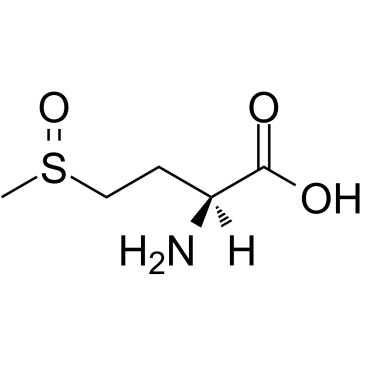
3226-65-1 |
| Literature: Yajurvedi, Deeksha; Kumbhani; Shashtri; Baghmar; Sharma, Pradeep K. Journal of the Indian Chemical Society, 2008 , vol. 85, # 4 p. 459 - 461 |
|
~25% 
3226-65-1 |
| Literature: Bulletin de la Societe Chimique de France, , vol. 133, # 1 p. 89 - 100 |
|
~% 
3226-65-1 |
| Literature: Chemistry - A European Journal, , vol. 17, # 30 p. 8371 - 8378 |
|
~% 
3226-65-1 |
| Literature: Chemical Research in Toxicology, , vol. 23, # 1 p. 258 - 263 |
|
~% 
3226-65-1
Detail
|
| Literature: Chemical Research in Toxicology, , vol. 23, # 1 p. 258 - 263 |
| Precursor 3 | |
|---|---|
| DownStream 9 | |
| HS Code | 2930909090 |
|---|---|
| Summary | 2930909090. other organo-sulphur compounds. VAT:17.0%. Tax rebate rate:13.0%. . MFN tariff:6.5%. General tariff:30.0% |

